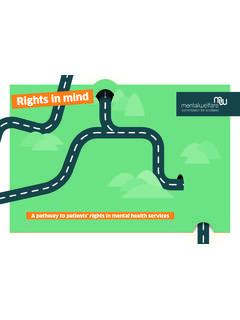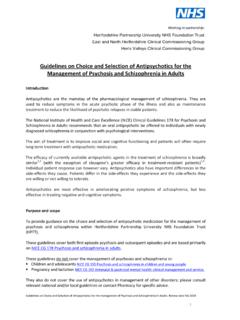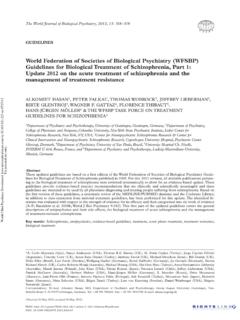Transcription of GOOD PRACTICE GUIDE Drug-induced psychosis …
1 GOOD PRACTICE GUIDEDrug-induced psychosis and the law3 ContentsIntroduction 5 Background 7 Use of mental health legislation 10 Compulsory measures to prevent drug misuse 13 Conclusions 154 Our aimWe aim to ensure that care, treatment and support are lawful and respect the rights and promote the welfare of individuals with mental illness, learning disability and related conditions. We do this by empowering individuals and their carers and influencing and challenging service providers and policy makers. Why we do thisIndividuals may be vulnerable because they are less able at times to safeguard their own interests.
2 They can have restrictions placed on them in order to receive care and treatment. When this happens, we make sure it is legal and we areWe are an independent organisation set up by Parliament with a range of duties under mental health and incapacity law. We draw on our experience as health and social care staff, service users and valuesWe believe individuals with mental illness, learning disability and related conditions should be treated with the same respect for their equality and human rights as all other citizens. They have the right to: be treated with dignity and respect ethical and lawful treatment and to live free from abuse, neglect or discrimination care and treatment that best suit their needs recovery from mental illness lead as fulfilling a life as possibleWhat we do Much of our work is at the complex interface between the individual s rights, the law and ethics and the care the person is receiving.
3 We work across the continuum of health and social care. We find out whether individual care and treatment is in line with the law and good PRACTICE We challenge service providers to deliver best PRACTICE in mental health and learning disability care We follow up on individual cases where we have concerns and may investigate further We provide information, advice and guidance to individuals, carers and service providers We have a strong and influential voice in service policy and development We promote best PRACTICE in applying mental health and incapacity law to individuals care and treatment5 IntrOductIOnWhen is it appropriate to use mental health legislation for Drug-induced psychosis ? The following three cases are examples of the range of difficulties we heard about.
4 Some details of these cases have been changed to reduce the risk of identifying individuals. case 1 Alex had been known to mental health services for some time. He used amphetamines, cocaine and cannabis intermittently. He had a diagnosis of probable schizophrenia. He became floridly psychotic with hallucinations and persecutory delusions after using drugs. On these occasions, he often came to the attention of the police. He agreed to be admitted to hospital for short periods. Psychotic symptoms subsided within 48 hours. Between episodes, he was withdrawn and slightly paranoid. He had been offered addiction services but declined to attend. He was never treated under mental health presented with an acute psychotic episode after taking drugs. He was apprehended by the police because he was acting bizarrely to strangers in the street.
5 He had a concealed weapon but said it was for self defence. He had been hearing voices telling him to kill a family member. Police took him to hospital where, as usual, he agreed to be admitted next day, his psychotic symptoms subsided and he wished to go home. He was assessed as not detainable as there were no ongoing psychotic symptoms. Unfortunately, he took amphetamines a few days later, acted on the voices he heard and killed a family 2 Brian, aged 20 years, had been admitted to the psychiatric unit voluntarily. This was his first presentation and he was not previously known to psychiatric services. He had taken a large quantity of LSD along with cannabis. He was hallucinating and had no sense of what was real or not. He refused to stay, refused medication, said he wanted to kill himself and was detained under an emergency and then a short-term detention certificate.
6 With medication, he improved quickly and the detention certificate was revoked. He was discharged home with no mental health 3 Colin was in his forties. He had been diagnosed as having paranoid schizophrenia since his late twenties. He also used amphetamines regularly and other drugs at times. He had over 30 admissions to hospital because he became unwell as a result of using amphetamines and not taking his medication. He did not understand that this caused him to become was homeless for some time and came to the attention of services three years ago. He was detained in hospital and remains on a compulsory treatment order. He has spent time out of hospital and receives medication by depot injection, but he uses drugs at times and can experience psychotic symptoms.
7 Sometimes, this causes him to behave violently, resulting in police involvement and readmission to care team wants to support Colin in the community. The care plan would need to involve engaging Colin in help to address his drug taking. There is uncertainty about the use of compulsory powers to enforce this, as well as ensuring continued medication and case examples show some of the dilemmas in using mental health legislation for people whose episodes of psychosis appear to be provoked by taking street drugs. Should mental health legislation be used at all, especially for individuals who appear to make a very quick recovery? How long should compulsory treatment continue? Should it be used long term to try to prevent psychosis arising from drug use?
8 We could find no existing guidance on the use of mental health legislation in any of the literature we examined. We thought that practitioners would benefit from some guidance in this we approached the problemWe needed the help of a wide range of organisations and individuals to answer these questions. We contacted mental health, social work, voluntary, criminal justice, service user and carer organisations. We asked them to provide cases where there had been difficult decisions to make. Some of the cases they submitted formed the basis for the above case examples. We invited them to a consultation event in October 2012. Their views and advice formed the basis for this guidance. We are grateful to them and to those who responded when we sent an earlier draft for wider Mental health legislationWe had to consider the grounds for compulsory treatment as set out in the Mental Health (Care and Treatment) (Scotland) Act 2003 ( the 2003 Act ).
9 Broadly, the grounds are: The presence of mental disorder . This includes mental illness, learning disability and personality disorder. There are some exclusions. Most importantly, use of, or dependence on, alcohol or drugs does not in itself constitute mental disorder. Mental illness that results from drug or alcohol use, or accompanies it, is a mental disorder under the 2003 Act. The relationship between drugs and mental illness is complex and is dealt with in the next section. There is treatment available for the mental disorder. Treatment is defined broadly and includes care, nursing, psychological treatments, habilitation and rehabilitation in addition to physical treatments. Significantly impaired decision-making ability (SIDMA). This applies to civil compulsory orders but not to orders relating to criminal procedures.
10 Risk: to the individual s own health, safety or welfare or to the safety of any other person. Necessity. There must be reasons why the individual cannot be treated without the use of and compulsory treatment are major interferences with individuals liberty and personal choice. The grounds for compulsion must always be properly documented and are open to challenge at the Tribunal. All long-term civil orders are granted by the Tribunal. It also reviews all long-term civil orders and all mental health orders granted after conviction for a criminal principles as set out in part one of the 2003 Act must GUIDE all of information, participation, range of options, maximum benefit, carer information and support, minimum restriction of freedom and reciprocity are especially the 2003 Act, it is possible to test detained individuals for the presence of alcohol or drugs, but only in accordance with section 286 of the Act and associated regulations.














